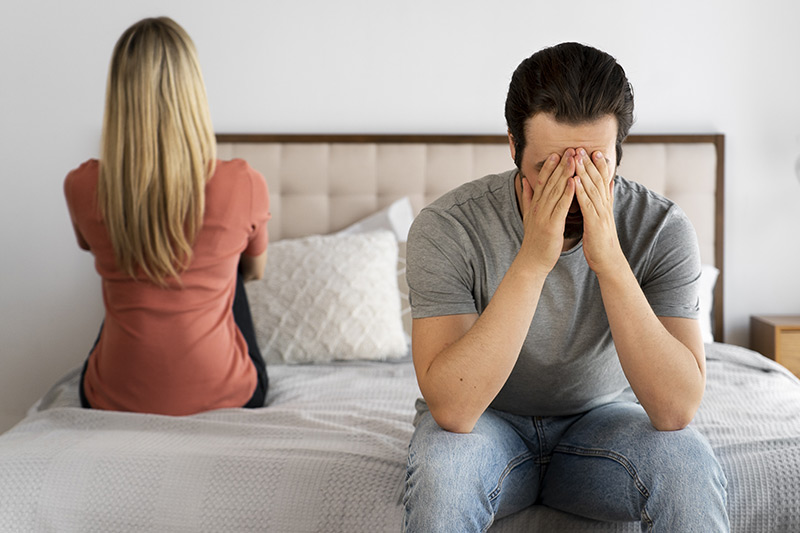
The lack of sexual desire in a relationship can be a delicate and complex issue. If you find yourself in this situation, it’s natural to feel confused, hurt, or worried.
However, we receive little education about sexual desire and how to address its loss. In this blog, we will discuss the key points to consider in supporting your partner and helping them find a solution.
How to recover sexual desire in a couple?
1. Communication
Communication is key in any relationship. Talk to your partner about how you feel without blaming or attacking them.
Choose the right time. Look for a moment when both of you are calm and there are no distractions. Avoid bringing up the topic in the middle of an argument or when either of you are stressed or tired, as it can come across as if you’re at your limit and blaming your partner.
Be honest and direct but loving. Express your feelings clearly without blaming your partner. For example: “I want to talk to you about something that has been worrying me. I feel that we haven’t been very intimate lately, and it makes me feel a bit disconnected. I’d like to know how you feel about it.”
Avoid phrases like “You never want to do it anymore,” “You’ve become frigid,” or “It seems like you don’t care.”
Active listening. Allow your partner to express their feelings and concerns without interrupting.
Open dialogues. Talk openly about your desires and needs and encourage your partner to do the same.
Use ‘I’ statements. Speaking from your own perspective can prevent your partner from feeling attacked. For example: “I’ve been feeling a bit insecure about our sex life lately. I care a lot about our relationship and want to make sure we’re okay.”
Avoid making assumptions or accusing your partner: “You don’t love me anymore,” “The problem is you don’t find me attractive,” “You must like someone else.”
Show empathy and understanding. Acknowledge that your partner may be going through something difficult and be understanding. The lack of sexual desire can be frustrating for both of you, so show empathy towards your partner.
For example: “I understand that there could be many reasons why you feel this way. I’d like us to work together to understand what’s happening and find a solution that works for both of us.”
Avoid pressure. Don’t pressure your partner to change quickly; patience is key.
If you apply too much pressure, get angry, or even punish your partner (e.g., by ignoring them), it may cause your partner to force themselves to have sex without wanting to, leading to a counterproductive effect where they grow to dislike sex more and avoid it. Another possible outcome is that your partner feels guilty, undermining their self-esteem and making it even harder for them to reconnect with their desire.
Don’t get angry every time your partner turns you down or if things don’t progress as quickly as you would like. Your partner doesn’t choose to feel this way and is not doing it to hurt you.
Be patient and open to dialogue. The first conversation might be the start of a longer process. Be patient and willing to keep discussing the issue.
Offer support and seek joint solutions. Show your willingness to work together to improve the situation. You and your partner are a team, and your partner needs to know that not all the responsibility falls on them. Ask how you can help or suggest seeking professional counseling.
Encourage self-care and self-exploration. Encourage your partner to spend time on activities that bring them pleasure and relaxation and motivate them to explore their own sexuality in a safe and pressure-free way.
Maintain a positive attitude. Acknowledge and celebrate small progress in your relationship and sexual intimacy. Be a constant and motivating support for your partner throughout this process.
2. Understand the Underlying Causes
The lack of sexual desire can be due to many reasons, including:
- Stress and fatigue: Work, family responsibilities, and other stress factors can affect sexual desire.
- Sharing responsibilities: Help your partner with their daily tasks to reduce their burden.
- Relaxation time: Encourage relaxing activities together, such as walks, massages, or a quiet evening at home.
- Health issues: Medical conditions, hormonal imbalances, and medications can have an impact.
- Regular exercise: Encourage physical activity, as it can improve mood and energy.
- Balanced diet: Help maintain a healthy diet that supports overall well-being.
- Adequate sleep: Ensure that both of you are getting enough sleep.
- Emotional or psychological issues: Anxiety, depression, and self-esteem problems are important factors.
- Relationship problems: Unresolved conflicts, lack of emotional connection, or resentments can decrease sexual desire.
- Keep in mind that your attitude towards the issue can improve or worsen the situation.
Investigating and understanding these possible causes can be an important first step.
3. Explore New Forms of Intimacy
Intimacy doesn’t always have to be sexual. Exploring other ways to connect, such as hugging, massages, spending quality time together, and expressing affection, can strengthen the emotional bond, which in turn can rekindle sexual desire.
Spending quality time with your partner, without distractions like phones or televisions, can strengthen the emotional connection and foster sexual desire. Take time to strengthen your emotional connection with activities like romantic dates, deep conversations, and moments of affection. Increase non-sexual displays of affection, such as hugs, kisses, and caresses.
4. Consider Both of Your Libidos
It’s normal for people to have different libido levels. Understanding and respecting the differences in sexual desire is important. You cannot force your partner to have the same level of libido as you.
5. Reignite the Passion
Sometimes, routine can affect sexual desire. Introducing novelty and surprise into the relationship, such as romantic dates, weekend getaways, or exploring new sexual fantasies, can help reignite passion and improve the couple’s sex life.
- New Experiences: Try new activities or sexual fantasies that both of you are comfortable exploring.
- Games and Accessories: Introduce sex toys or couple’s games that can add novelty and fun.
- Read Together: Reading erotic literature or watching romantic or erotic movies (not necessarily pornographic) can serve as inspiration and increase sexual desire.
6. Seek Professional Help
Sometimes, it’s helpful to seek sexological help. In counseling, we can help identify and work through the underlying issues. Couples therapy can also provide a safe space to discuss these topics.
Júlia Tarancón Estades
Psychologist Col. No B-3232








